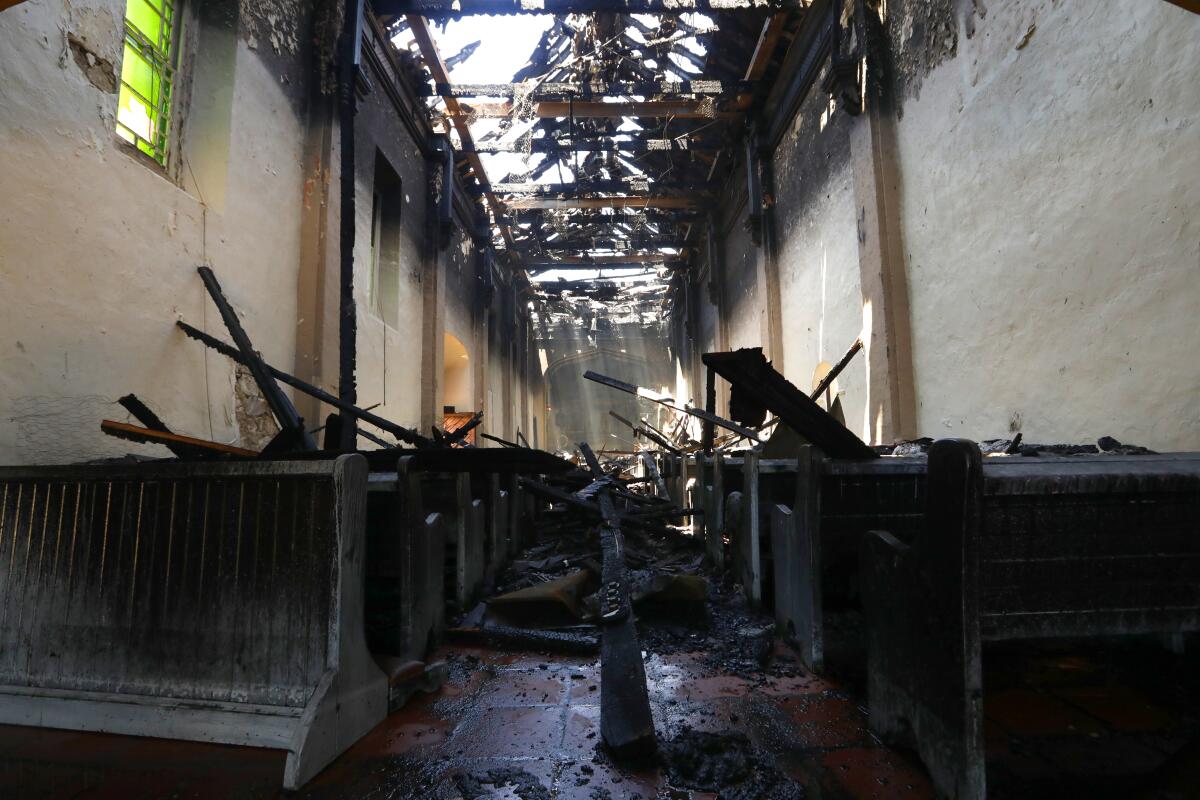Investigators enter new phase in probe of fire that destroyed much of San Gabriel Mission

Investigators on Sunday were continuing to search for the cause of a fire that erupted at the San Gabriel Mission, destroying the roof and much of the interior of the 215-year-old church building.
By Sunday morning, the team had finished combing through the scene and moved to a phase of the probe where each investigator develops a hypothesis on the cause of the fire, which they then try to prove or disprove, said Capt. Antonio Negrete, public information officer for the San Gabriel Fire Department.
As part of the investigation, they were also reviewing video from a security camera that was pointed at an area where a statue of Franciscan Father Junípero Serra was until last week, when the mission moved it out of public view after other statues of Serra were toppled elsewhere.
At 11 a.m. Sunday, Los Angeles Archbishop José H. Gomez said Mass in the mission’s chapel as the L.A. Archdiocese launched a fundraising effort to restore the damaged church.
“In this long season of sickness and death since the coming of the coronavirus, this is one more trial, one more test,” Gomez said during his homily. “We ask the Lord to grant us comfort and consolation. We ask him to strengthen and increase our faith.”
He said the fire, although painful, “changes nothing.”
“Mission San Gabriel will always be the spiritual heart of the church in Los Angeles, the place from which the gospel still goes forth,” he said.
The church had been closed because of the coronavirus outbreak since March but was slated to reopen a week from Saturday. During the closure, the mission had refurbished the pews and walls, both of which were severely damaged by the fire. More renovations were planned leading up to the mission’s 250th anniversary next year.
Still, church officials took some solace in the fact that the mission had removed historic paintings and artifacts from the sanctuary ahead of the renovations, sparing them from damage. The church’s altar and the wooden statues attached to it also remained intact.
“It’s a resilient old building, and we are a resilient mission community,” Terri Huerta, director of development and communications for the mission, said Saturday.
The fire, which broke out at 4:24 a.m. Saturday and burned for nearly 2½ hours, came amid rising anger over California missions and other colonial monuments that for many serve as painful reminders of the nation’s racist history.
Investigators, including a regional arson task force and a representative from the federal Bureau of Alcohol, Tobacco, Firearms and Explosives, were looking into whether the fire was intentionally set, officials said. Negrete said the area where a statue of Serra had stood before being moved last week was where firefighters first saw flames, although it was not yet clear if the fire actually started there. In addition to security video at the mission, officials were canvassing the area for additional footage, he said.
“They’ll be going through all that,” Negrete said, “and hopefully in about a week or sooner they’ll have something concrete.”
The San Gabriel Mission has a complicated legacy. Founded by Serra in 1771, it is considered by historians to be the most important base of operations for the Spanish conquest of California. Ten years later, a group of the mission’s residents departed and established the city of Los Angeles.
San Gabriel was the fourth of 21 missions established in California and one of the grandest. But it was built on the backs of the Tongva and other indigenous people, whom the friars forced into labor and coerced into converting to Catholicism and assimilating to their culture. Thousands of unnamed dead are buried on the mission’s grounds, historians say.
Serra was the architect of the mission system, and statues of his likeness have been the target of vandalism in recent years by activists who point to how the system enslaved and killed off Native Californians. Those protests grew in the wake of the recent death of George Floyd in Minneapolis police custody, which ignited a nationwide reckoning over racial justice.
Still, the San Gabriel Mission is also considered sacred ground among the Catholic faithful and has been the site of countless baptisms, weddings and funerals, with some families reporting connections that date back generations.
“For all of us parishioners, it’s our gathering place, it’s the center of our spiritual lives,” said Julie Sanchez Brehov, who has been attending the church all 27 years of her life and was married there in November.
She recognizes, though, that it has a history of harm.
“When I think of the mission, in my personal experience, it’s my gathering place and it’s a place where people are welcome, and we do try to live the way that Christ taught,” she said. “But I do understand … that people in the history of the church have acted unjustly, and that’s something that can be very difficult to reconcile.”
Times staff writer Sonali Kohli contributed to this report.
More to Read
Sign up for Essential California
The most important California stories and recommendations in your inbox every morning.
You may occasionally receive promotional content from the Los Angeles Times.











